
Civil Wedding in the Philippines - Requirements, Process, Costs, and Suppliers
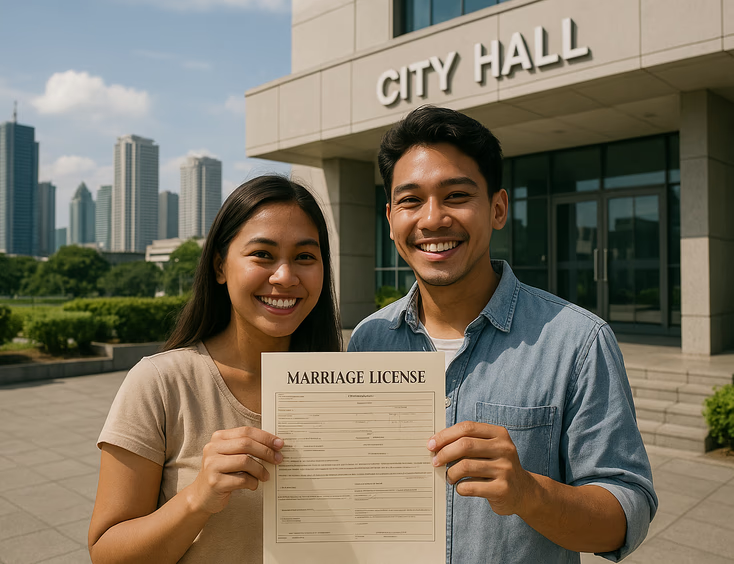
Planning a civil wedding in the Philippines is straightforward once you know the documents to prepare, where to apply, and who to book. This guide walks you through the requirements, the step by step process, realistic costs, and the suppliers you will want for a smooth city hall or courthouse ceremony.
Quick take: Apply for a marriage license in the city or municipality where either of you resides, attend a pre marriage seminar if required, observe the publication or waiting period, then schedule an officiant for your ceremony. Bring two witnesses of legal age and valid IDs. Always confirm city specific rules with your local civil registrar.
Table of contents
- What is a civil wedding
- Requirements and documents
- Step by step process
- Costs and sample budgets
- Where to get married
- Who to book and when
- After the ceremony
- Checklist
- FAQs
What is a civil wedding
A civil wedding is a legal marriage ceremony performed by a judge, mayor, or other authorized public official. It is simple, short, and focuses on legal requirements rather than religious rites. You can keep it intimate at city hall or elevate it with a small venue, photos, and styling.
Good to know
- A marriage license is usually valid for 120 days from the date of issue. Apply in the LGU where either partner resides, then you can typically marry anywhere in the Philippines during the validity period.
- At least two witnesses of legal age are required.
- Rules may vary by LGU, so always confirm with your Local Civil Registrar.
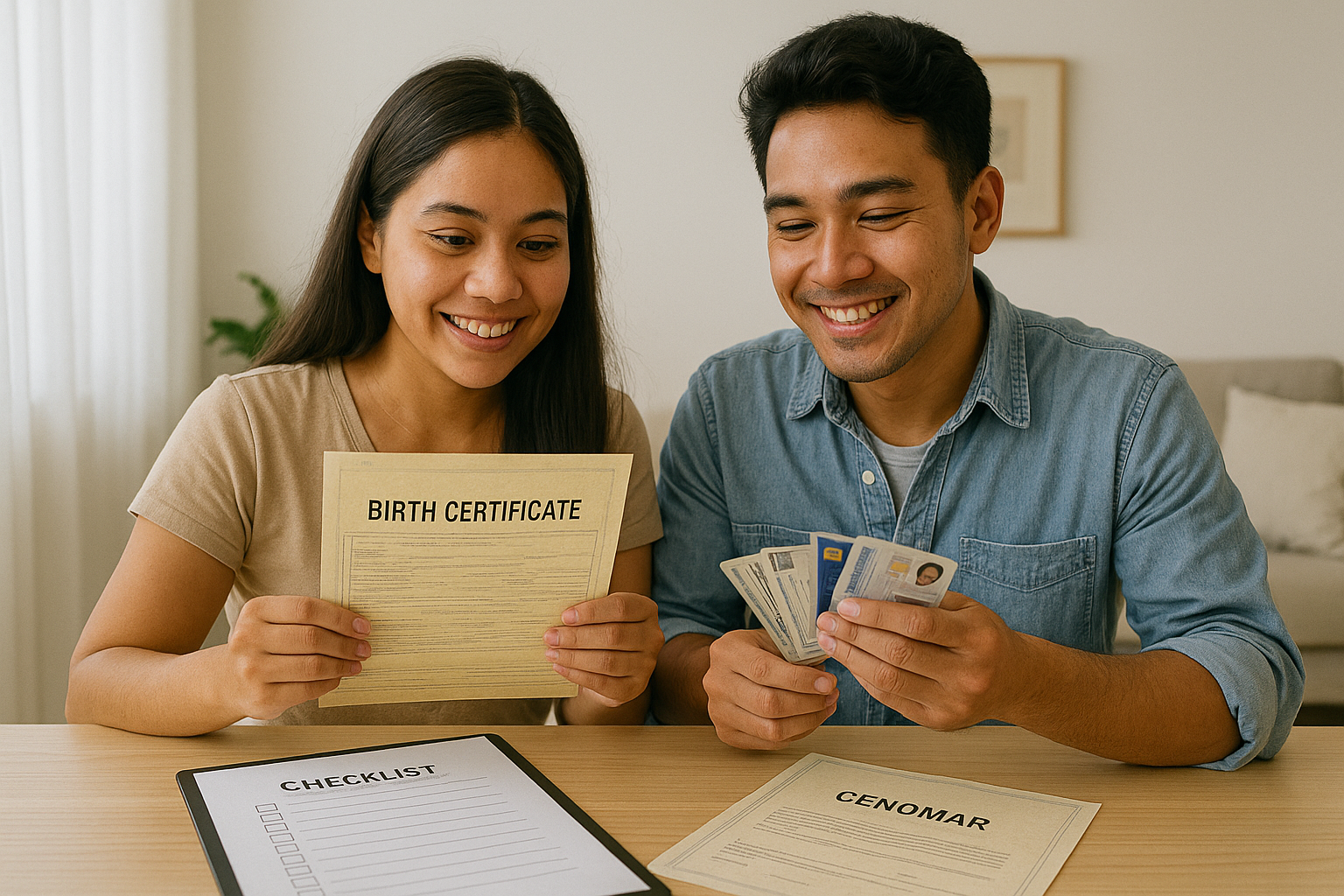
Requirements and documents
Prepare clear photocopies and bring originals for verification. Names and details on all IDs and certificates should match.
For both applicants
- Government issued IDs with the same address or proof of residence
- PSA issued birth certificates
- CENOMAR or Certificate of No Marriage Record from PSA
- Recent ID photos, size and background may vary by LGU
- Marriage license application form from your Local Civil Registrar
- Pre marriage counseling or family planning seminar certificate, if required
- Barangay certificate of residency, if required
If 18 to 20 years old
- Written parental consent, signed in front of the Local Civil Registrar
If 21 to 25 years old
- Written parental advice, usually presented during license application
If previously married
- Death certificate of deceased spouse, or
- Court decree of annulment or nullity, or
- Court decree of legal separation with required documents
If foreign national or marrying a foreign national
- Passport and proof of legal capacity to marry from your embassy or consulate
- Certified translations if documents are not in English or Filipino
- Proof of visa status if required by the LGU
Tip: Some LGUs request additional documents like community tax certificates, cedulas, or police clearances. Ask your Local Civil Registrar for the exact checklist and fees before you visit.
Want to learn more about requirements and legal must-dos? Read it on Requirements & Legal Guide
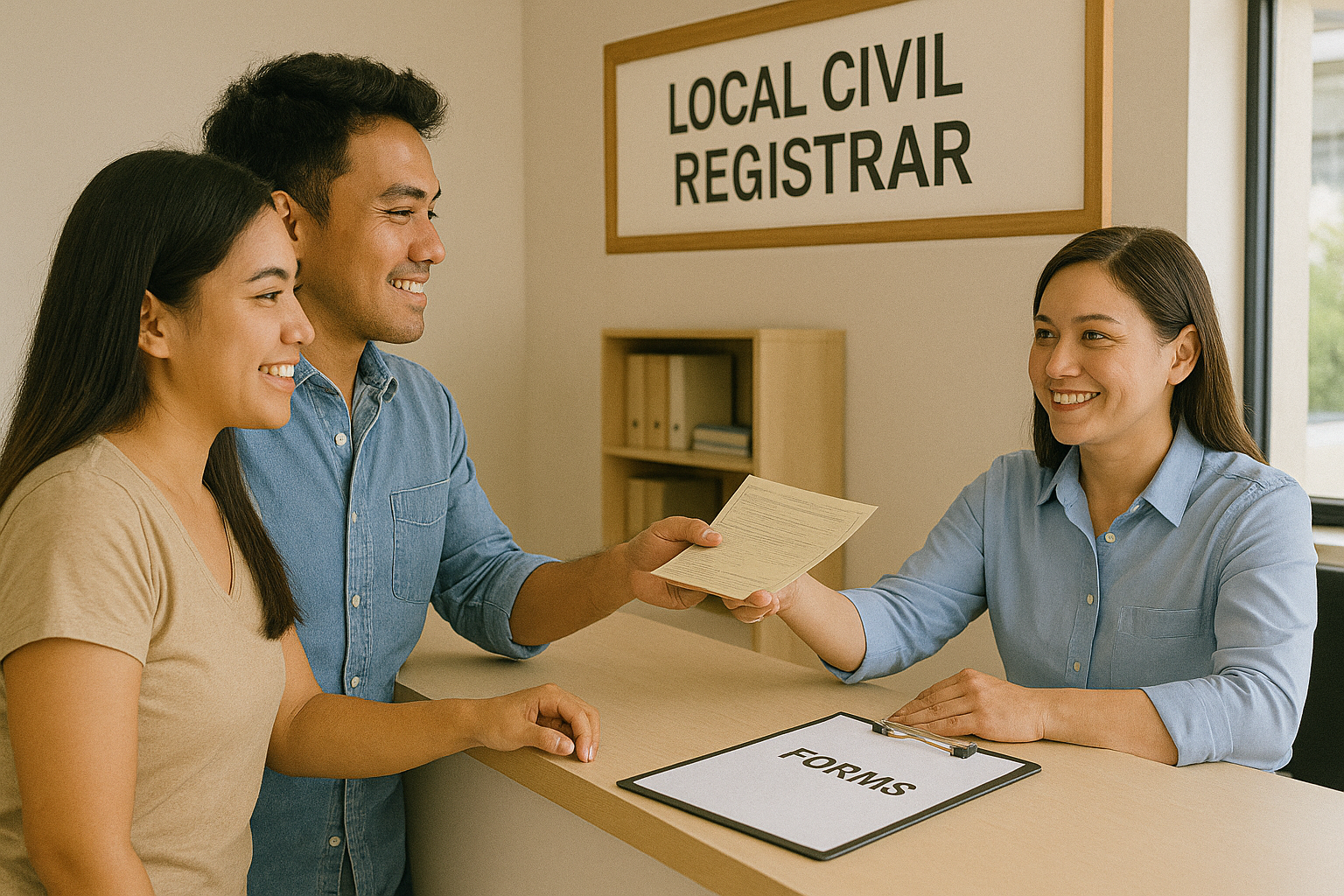
Step by step process
Use this timeline as a practical roadmap. Adjust based on your city or municipality.
1) Two to four weeks before target date
- Decide the city or municipality where you will apply for the license.
- Gather PSA documents and valid IDs.
- Book your pre marriage seminar if required.
- Pencil book suppliers who need lead time such as photographer and HMUA.
2) Marriage license application
- Visit the Local Civil Registrar of your chosen LGU.
- Submit forms and documents, pay the application fees, and schedule the seminar if applicable.
- The notice of marriage is posted. A waiting period usually applies.
3) Schedule your ceremony
- Coordinate a date and time with an authorized officiant such as a judge or mayor.
- If you want an offsite ceremony within the LGU or at a private venue, ask about permits and honorarium.
4) Day before the wedding
- Prepare your outfits and rings.
- Pack your document folder and two black ballpens.
- Confirm arrival times with your witnesses and suppliers.
5) Wedding day
- Arrive early with both applicants and two witnesses.
- Present IDs and license, then proceed to the ceremony room or venue.
- Exchange vows, sign the marriage contract, and take photos.
- Pay the officiant’s official fees or honorarium if any.
6) After the ceremony
- The accomplished marriage certificate is forwarded to the Local Civil Registrar for registration.
- After registration, you may request a certified local copy.
- The PSA copy is available later. Processing time varies by LGU and season.
Want to learn more about building your plan step by step? Read it on Planning Walkthrough

Costs and sample budgets
Actual fees vary by LGU and by your supplier choices. Use these ranges to plan, then confirm locally.
Typical cost items
| Item | What to expect |
|---|---|
| Marriage license and LCR fees | Application, certificates, and seminar if required |
| Ceremony fee or honorarium | Judge, mayor, or authorized officer. Rates differ for residents and non residents, and for offsite ceremonies |
| Venue or room rental (optional) | City hall room, small function space, or cafe micro reception |
| Photographer | Hour based civil wedding packages are common |
| Hair and makeup | Bride or couple packages for morning or afternoon slots |
| Bouquet and boutonniere | Fresh or dried options |
| Attire and rings | Ready to wear options are common for city hall weddings |
| Transport and parking | Consider weekday traffic and parking fees |
Sample budgets
Ultra simple, ₱3,000 to ₱10,000
- LGU fees
- Two witnesses
- Minimal styling
- Phone or entry level camera photos
Practical add ons, ₱10,000 to ₱30,000
- One to two hour photo package
- HMUA for one person
- Simple bouquet and boutonniere
- Lunch with family at a nearby restaurant
Micro wedding feel, above ₱30,000
- Offsite permit or small venue
- Two to four hour photo coverage
- HMUA for two persons
- Arch or backdrop rental with florals
- Intimate catered meal
Save time: Request quotes once and let suppliers reply with availability and package inclusions. Use the Get Quotes form on this page.
Want to learn more about budgeting and real costs? Read it on Budget & Costs Playbook
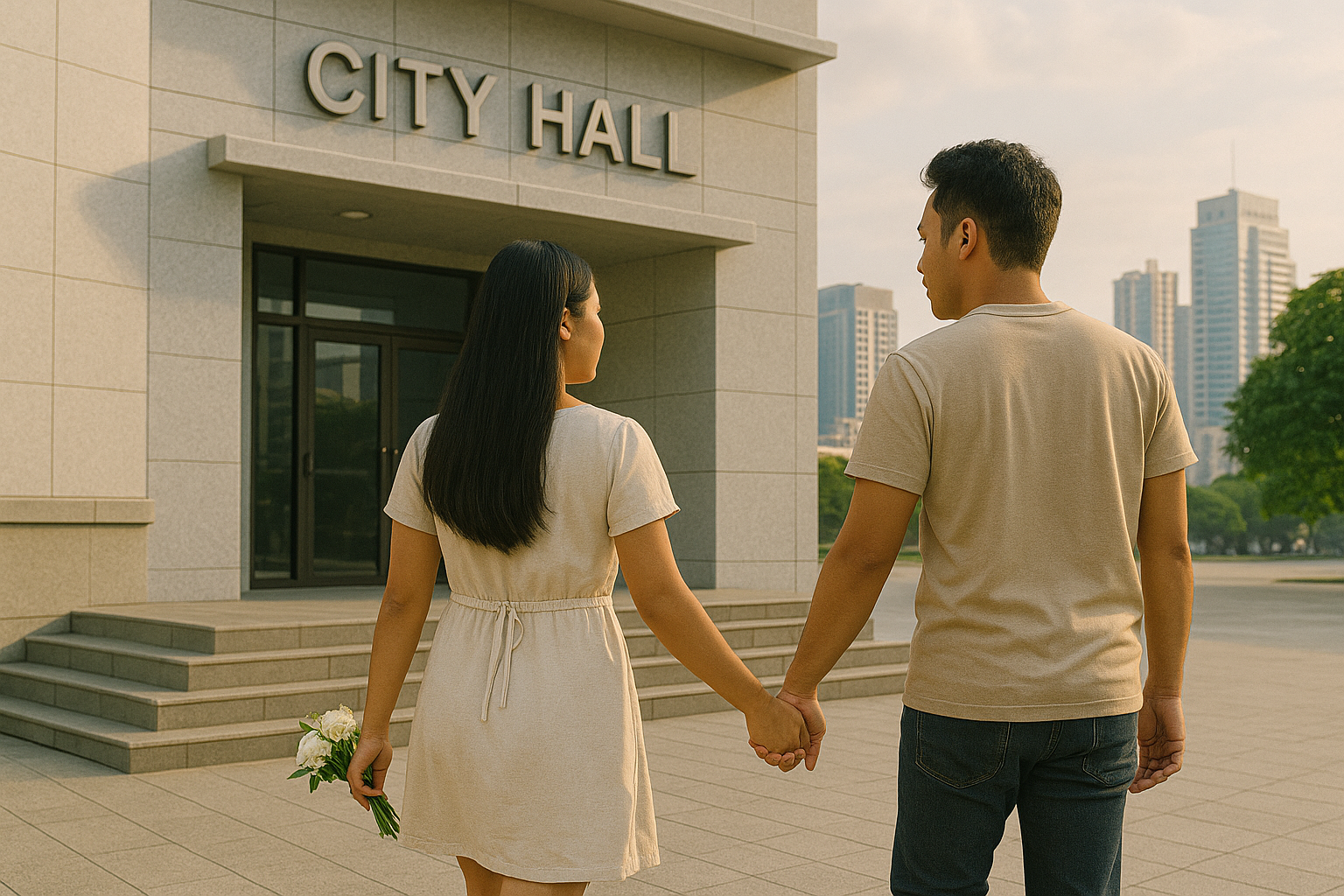
Where to get married
- City hall or municipal hall. Fastest setup. Some halls provide a ceremony room for small groups.
- Hall of Justice or court. Coordinate with the branch staff.
- Barangay hall or cultural center. Practical for local residents.
- Offsite within LGU. Garden, cafe, rooftop, or studio. Ask about permits and officiant honorarium.
- Private venue. For micro weddings, look for weekday rates and short time blocks.
Want to learn more about choosing venues and managing logistics? Read it on Venues & Logistics Guide
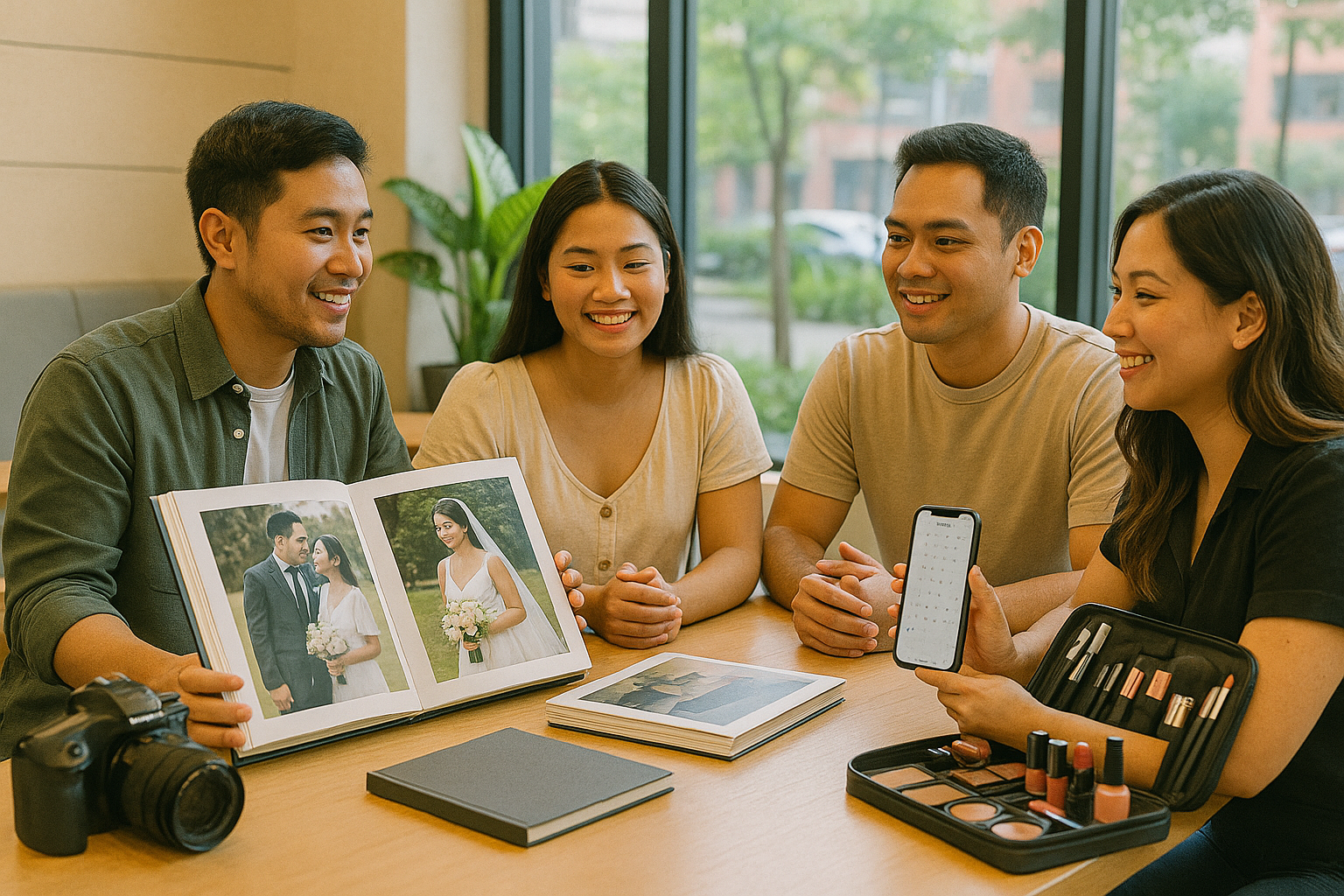
Who to book and when
Book early if your date is a Friday or numerically special.
- Officiant. Judge, mayor, or authorized officer. Confirm availability, location, and fees or honorarium.
- Photographer. Look for civil wedding minis with one to two hour coverage.
- Hair and Makeup Artist. Morning slots fill quickly. Confirm travel fee and early call time.
- Florist. Bouquet and boutonniere sets sized for a city hall ceremony.
- Styling or backdrop rental. Compact arches that fit in city hall rooms are popular.
- Attire. Ready to wear white dress, jumpsuit, barong, or suit.
- Coordinator (optional). Helpful if combining ceremony and lunch reception.
Explore supplier categories:
Want to learn more about hiring the right suppliers at the right price? Read it on Supplier Guides
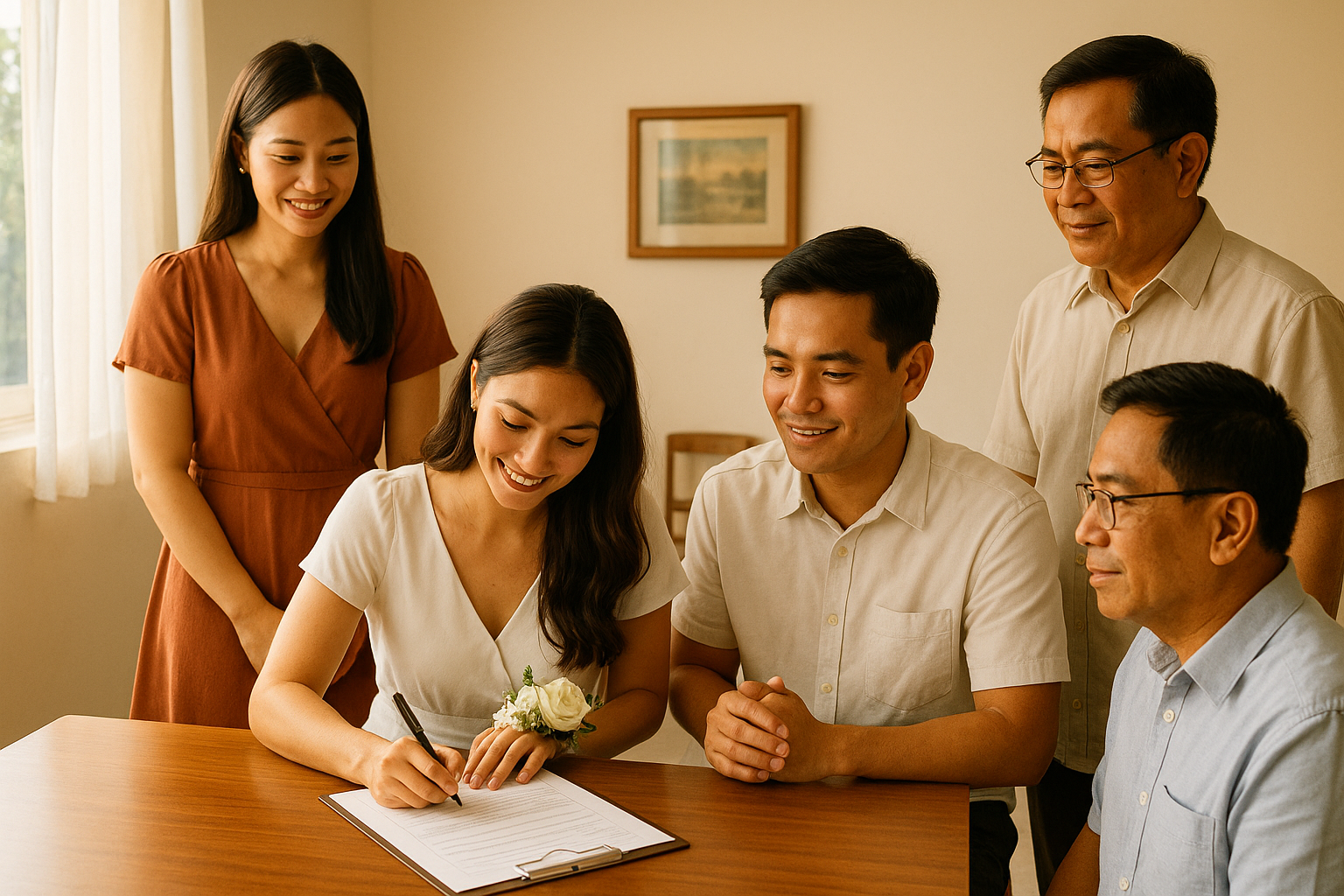
After the ceremony
- Local registration. The officiant or staff files your signed certificate with the Local Civil Registrar.
- Get a local certified copy. Useful for immediate transactions while waiting for the PSA copy.
- Request the PSA copy when available. You can order online or visit a PSA outlet.
- Update your records if changing your name. Start with valid ID, bank, SSS, PhilHealth, Pag IBIG, and passport. Always bring your marriage certificate and valid IDs.
Discover supplier in different cities:
Want to learn more about planning like a local in your area? Read it on Regional Playbooks
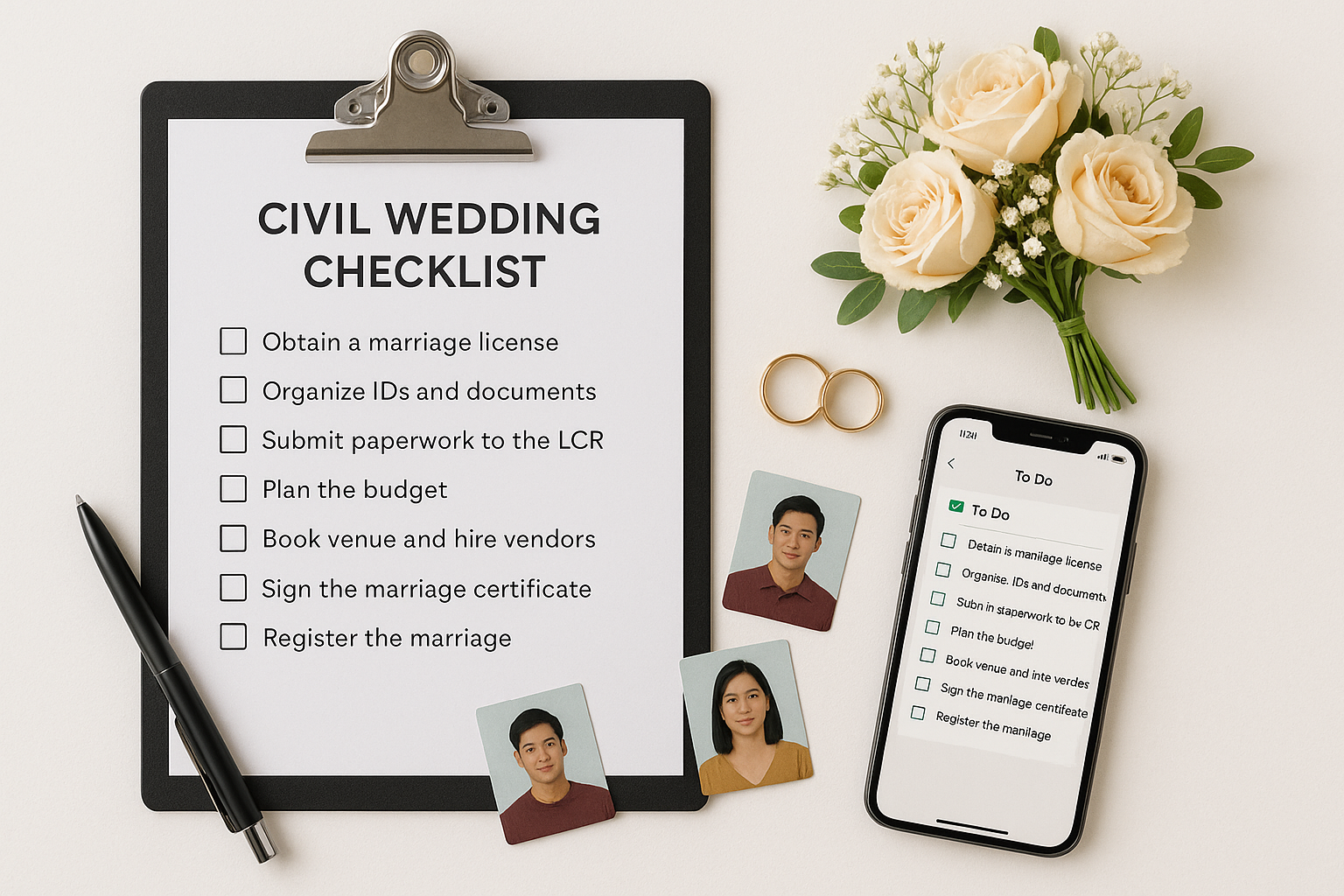
Checklist
Copy this to your phone or print as a one pager.
- [ ] Government IDs for both applicants
- [ ] PSA birth certificates
- [ ] PSA CENOMAR for both
- [ ] Pre marriage seminar certificate, if required
- [ ] Barangay certificate of residency, if required
- [ ] Passport and legal capacity to marry, if foreign national
- [ ] Parental consent or advice, if applicable
- [ ] Two witnesses of legal age with IDs
- [ ] Rings, pen, and small envelope for official receipts
- [ ] Officiant schedule and location confirmed
- [ ] Photographer and HMUA confirmed
- [ ] Bouquet and boutonniere ready
Want to learn more from real weddings and actionable inspiration? Read it on Inspiration & Real Weddings
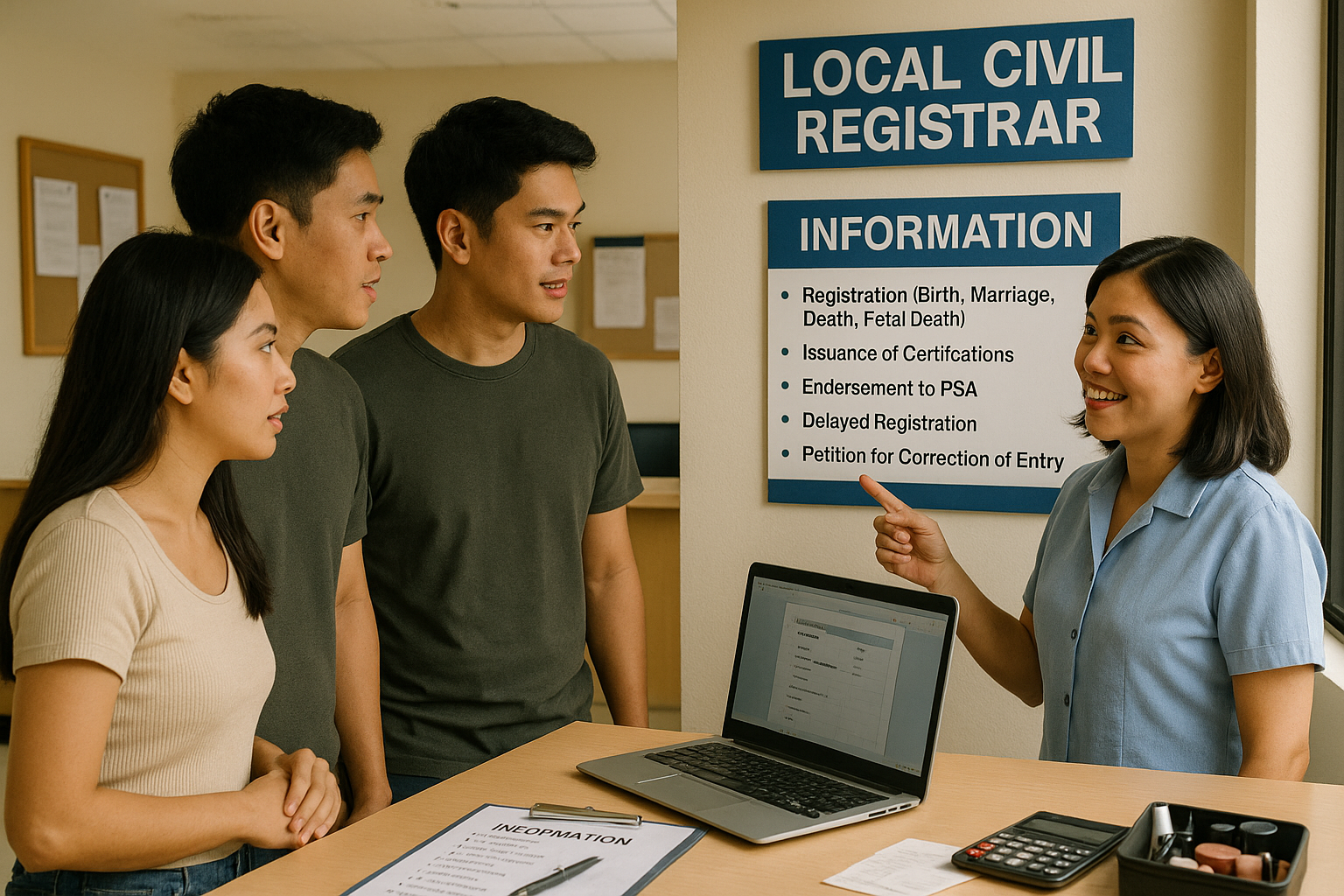
FAQs
How long is a marriage license valid
Usually 120 days from the date of issue. Confirm with your LGU when you apply.
Can we marry on a weekend
Some officiants accept weekend ceremonies by arrangement. City halls often operate on weekdays. Ask about offsite permits and honorarium.
Do we need witnesses
Yes. Bring at least two witnesses of legal age with valid IDs.
Can we marry in a different city from where we got the license
A license issued by the LGU where either applicant resides is typically valid nationwide within its validity period. Always check with your officiant and LGU for any local conditions.
What if our IDs show different addresses
Bring proof of residence such as a barangay certificate and discuss with the Local Civil Registrar.
Can a foreigner marry a Filipino in a civil ceremony
Yes, provided the foreign national presents a passport and proof of legal capacity to marry from their embassy or consulate, plus any other LGU requirements.
How soon can we get the PSA copy
Availability varies by LGU and season. You can request a local certified copy first, then order the PSA copy when it appears in the system.
Want to learn more about quick fixes and common questions? Read it on FAQs & Troubleshooting


